Ghana, Germany finalist ROCET employment pathway, set for first cohort in 2026
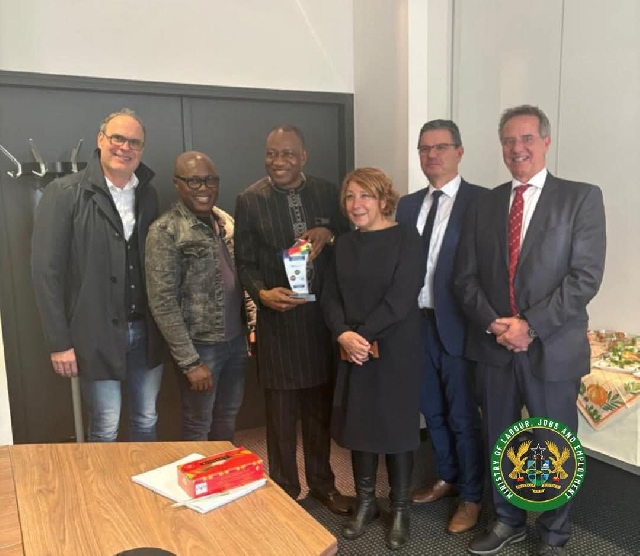 The Minister for Labour, Jobs and Employment, Dr. Rashid Pelpuo, holding plaque
The Minister for Labour, Jobs and Employment, Dr. Rashid Pelpuo, holding plaque
The Minister for Labour, Jobs and Employment, Dr Rashid Pelpuo, has reaffirmed the government’s resolve to tackle youth unemployment through robust international partnerships, following a high-level working visit to Germany.
During the visit, Dr Pelpuo received a commemorative plaque from Dr Bernd Garstka, CEO of the German-based organisation BFW (Berufsförderungswerk der Bauindustrie NRW), in recognition of Ghana’s steadfast collaboration with BFW and its partners.
The plaque symbolised the deepening cooperation between Ghana and Germany under a landmark Memorandum of Understanding (MoU) signed in July 2025 between the Ministry of Labour, Jobs and Employment (MoLJE), BFW, the Dominion Leaders Foundation (DLF), and RETOG.
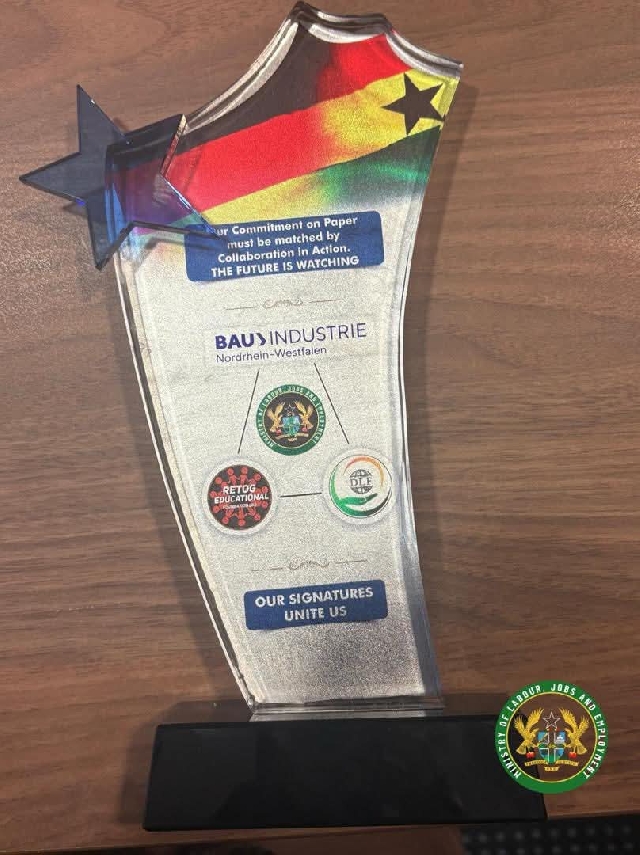
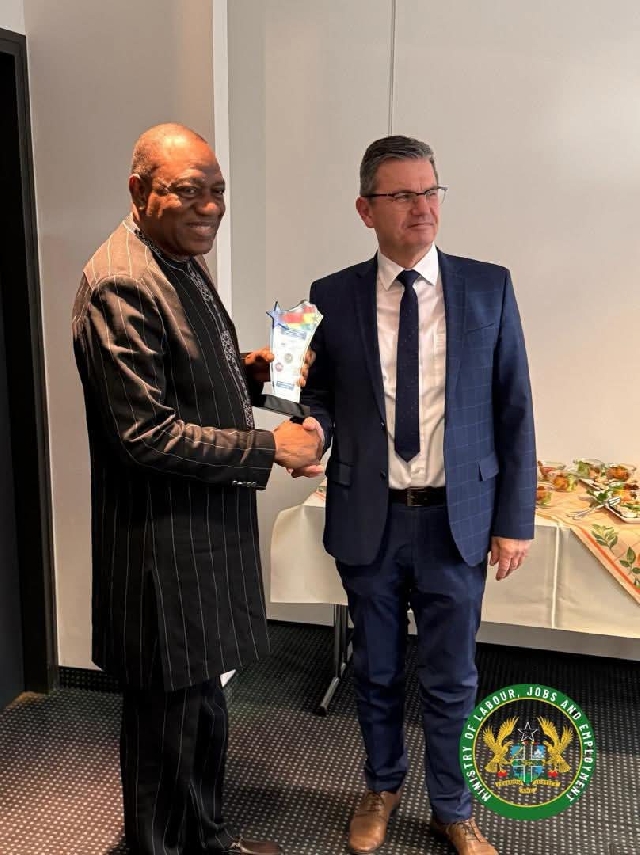
The MoU aims to drastically reduce youth unemployment in Ghana through the innovative ROCET Project, which blends skills development, job creation, and technology transfer.
“This visit underscores our government’s commitment to forging strong international partnerships to solve the pressing challenge of youth unemployment,” said Dr Pelpuo.
“The ROCET project, powered by this collaboration, represents a beacon of hope for our young people. I am particularly excited by the new projects, which will provide immediate skills upgrades and create clear pathways to employment.”
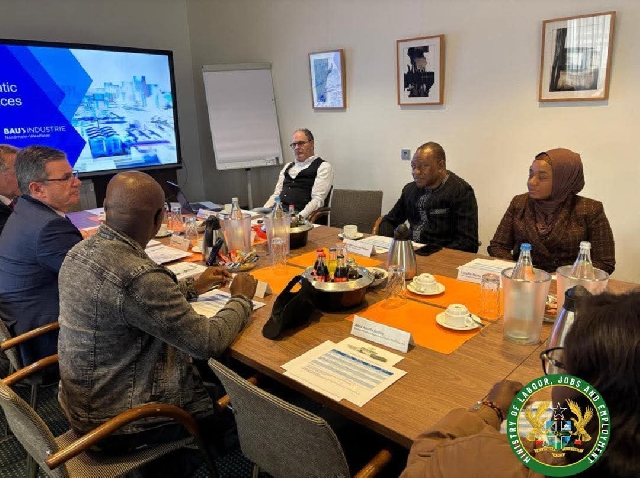
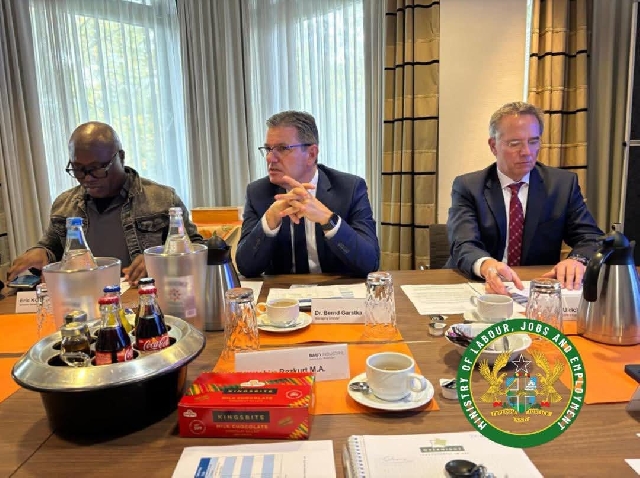
The working visit, held at BFW’s Kerpen Training Facility, provided an opportunity for Dr Pelpuo and his delegation to assess ongoing collaboration and explore new dimensions of the partnership.
The minister also expressed strong interest in three emerging initiatives focused on job creation and skills enhancement for Ghanaian youth. These include short-term professional courses and specialized training programmes for construction experts to be conducted at BFW’s world-class technical centres in Germany.
The high-level meeting brought together key stakeholders, including Mr Eric Kofi Adzroe, Director-General of the Ghana TVET Service; Madam Dolley Alice Akorfa, Director of HR, Ghana TVET Service; Dipl.-Ing. Ulrich Goos, Head of the TVET Center Kerpen; Dr Askim Bozkurt, Head of International Projects, BFW; and Mrs Lutufia Nuhu, Head of Research and Office Manager at MoLJE.
Mr Adzroe praised the partnership as a model of effective international cooperation, stating: “The alignment between BFW’s world-class technical expertise and the strategic objectives of Ghana TVET Service is exceptional. By integrating German dual training models with our national curriculum, we are not just creating job seekers; we are empowering a new generation of job creators.”
For Dr Pelpuo, this visit marked another major stride in his Ministry’s agenda to link education, skills, and employment opportunities under the government’s broader vision of economic transformation through human capital development. His proactive leadership has already driven several strategic collaborations with development partners across Europe and Africa.
Dr Garstka lauded the minister’s hands-on approach and leadership, noting that his commitment has accelerated the operationalization of the MoU: “We are not just signatories to an agreement; we are active partners in progress. Dr Pelpuo’s vision for a skilled Ghanaian workforce aligns perfectly with our mission to promote vocational excellence and sustainable employment.”
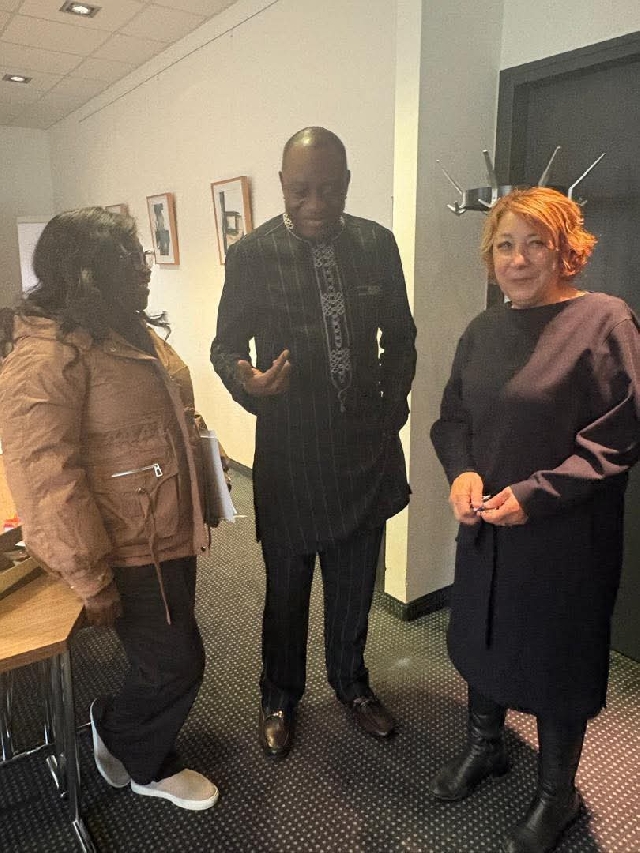
As the partnership advances, the Ministry of Labour, Jobs and Employment, together with its international counterparts, will fast-track the implementation of ROCET and related capacity-building initiatives.
The shared goal is clear — to produce a skilled, employable, and globally competitive Ghanaian workforce capable of meeting the evolving demands of the labour market.
Ghana and Germany have finalised a bilateral employment and training initiative that will create a new pathway for young Ghanaians to acquire technical skills and employment opportunities in Germany.
The agreement, reached during a high-level working visit by Ghana’s Minister for Labour, Jobs and Employment, Dr Rashid Hassan Pelpuo, marked the formal establishment of the ROCET Employment Pathway, a groundbreaking partnership that will see the first cohort of 30 Ghanaian trainees begin a three-year programme in 2026.
The finalised framework followed extensive discussions between the Ghanaian delegation and officials of Berufsförderungswerk der Bauindustrie NRW (BFW), a leading German training institution, and its Ghanaian partners, Dominion Leaders Foundation (DLF) and RETOG.
During the meeting, BFW’s Innovation Manager, Dipl.-Soz-Päd. B. Müller, presented the operational structure of the programme, which was designed to ensure transparency, quality selection, and the long-term success of participants.
Under the agreement, recruitment will be led jointly by the Ministry of Labour, Jobs and Employment, Dominion Leaders Foundation, and RETOG, targeting Ghanaian youth aged between 18 and 30 who were eager and qualified to pursue technical careers in Germany.
Selected applicants will undergo profiling and counselling by DLF and BFW to align their skills and interests with available trade areas.
DLF and RETOG will then facilitate German language and cultural preparation, with candidates required to attain certification at levels A1, A2, B1, or B2 before participating in employer interviews organised by BFW.


The interviews, which will include prospective German employers, will determine final candidate selection.
Successful applicants will receive employment offers through BFW and DLF and will be guided by the Ministry and DLF in securing the necessary visas and travel documentation.
Candidates will bear pre-departure costs, but upon arrival in Germany, they will receive a monthly allowance for the duration of their three-year programme, approximately €1,000 in the first year, €1,200 in the second, and €1,500 in the third year.


During the discussions, Dr Pelpuo emphasised Ghana’s commitment to making the programme a sustainable avenue for job creation and skills transfer.
He proposed an annual intake of 30 trainees and expressed confidence in Ghanaian youth.
"Be prepared to receive even more than 30. We have a pool of brilliant young people who are poised to not only learn the language but also excel in their fields.” He also commended DLF’s profiling model as a vital component for the program’s success," he remarked.
DLF’s Executive Director, Martha Akoibea Anang, called for inclusivity in the selection process, suggesting that candidates who did not attain the B2 proficiency level should be offered alternative training or employment pathways.
BFW welcomed the suggestion and pledged to explore partnerships with other recruitment and training institutions to expand opportunities for Ghanaian youth in additional trade sectors.

BFW’s Chief Executive Officer, Dr Bernd Garstka, described the partnership as a turning point in Ghana–Germany cooperation on employment and training.
"This meeting has moved the ROCET project from a vision to a concrete, actionable plan," he said.
"We are not just creating jobs; we are building careers and fostering a deep exchange of skills between our nations."
The ROCET Employment Pathway represents a collaborative effort between the Ministry of Labour, Jobs and Employment, BFW, DLF, and RETOG to address youth unemployment through international training and placement.
With recruitment for the inaugural batch set to begin in 2025, the initiative is expected to serve as a model for sustainable, skills-based migration and employment partnerships between African and European countries.
Source: classfmonline.com
Trending News
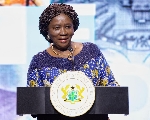
Vice President calls for renewed confidence in national currency
19:08
Infinity 970 director calls for united national effort to combat air pollution in Ghana
10:10
Book of Condolence opens for late former First Lady Nana Konadu Agyeman-Rawlings
15:09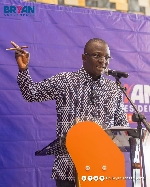
Propaganda against Bryan Acheampong collapses in Ejura as facts triumph over fiction
17:38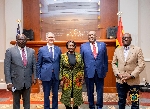
Vice President reaffirms gov't's commitment to inclusive development in Iowa
06:40
James Gyakye Quayson supports another batch of BECE graduates in Assin North
07:04
ChatGPT shares data on how many users exhibit psychosis or suicidal thoughts
17:38
MP for North Dayi elected to IPU Bureau of Young Parliamentarians
09:58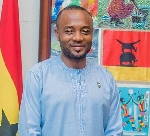
Weija-Gbawe MP raises concern over collapse of NHIS, decry return to cash-and-carry system
14:45
Victor E. Smith: GH-US Amb remembers Mrs Agyeman-Rawlings 'who introduced me into active politics'
18:02




